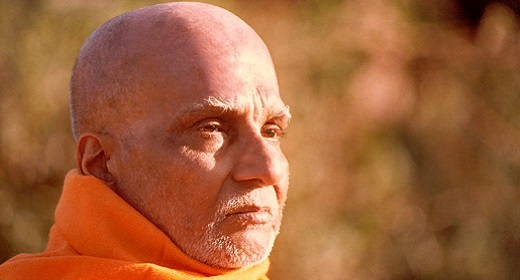David Welch: What would you say is the purpose of life? Or of your life?

Catherine Ingram: My life. Hmm. I don’t really hold it in that kind of concept. I just see it as an unfolding on its own. I don’t really have much direction in it. I can only see it in hindsight, the purpose you know, or just the unfolding. I’m a little weary of ideas such as purpose. They seem human-centric.
David: Or maybe too masculine as a concept?
C: A little bit. (laughter) Yeah, fair enough. And it is a concept that’s been bandied about in spiritual circles for many, many years—purpose, finding one’s purpose. But it’s not a concept I particularly resonate with. I kind of go with Jesus’s quote, “Consider the lilies of the field, they toil not.” You know, we’re just here, like all the living creatures, the plants and animals. What I can say to this question though is that as I lose more people in my life, it becomes very clear that the only thing one leaves behind of any value is the love in the hearts of those who you loved and who loved you. That’s all that gets left of any worth.
You know, for us as Americans, there’s such a pressure to do something big and to be important, be somebody. I think that impulse also carries over to a hope for leaving one’s mark after death as well. But, really, what any of us are going to leave of any value is going to be the love in the hearts of those left behind who loved us and who we loved. That’s what will be treasured, remembered and passed on because when your well is filled in that way, when love is the essence of what you consider important and then let’s say through the death of one of your loves ones, that becomes all the more tender, all the more clear, all the more strong, then that love gets passed on to all the people you’re interacting with.
So when you asked me about my life in terms of the influences and I said that I’ve had a lot of loss, I would say that the fire of loss has made me realize how important it is, to borrow a cliché, to shine your light and to let light come into you from all those who are shining theirs, to really let that be the primary value of your life.
David: Yes, co-collaboration of light. If you were going to attempt to describe God, what would you say?
Catherine: Well, it is also not a concept that I play with much any more although I have in the past, referring to the primordial force or the source of all existence. Those kinds of sweeping definitions of God. But I’m reluctant to use that concept at all because it’s just so loaded with conditioned ideas, so I tend not to use the word or the concept. I tend to be careful in my use of language and prefer very basic and practical ways of describing things because I see how concepts can be tried on and then worn like a cloak and that cloak can buffer you from the living truth. A veil covering reality. I’ve seen this so many times. So, I’m very careful about my use of these kinds of concepts. I don’t have any trouble, though, when I hear somebody using the word God in a very expansive way. I just gave a talk at a Unity Church this past Sunday, and prior to and after the talk there was a lot of hymn singing in which they’re using the word God, but you do sense that they’re using it in this very universal way which is quite beautiful. So, yeah, I don’t have the kind of resistance that some of my atheist friends do to that word, but I also, personally, don’t use it.
David: It can have negative connotations and limiting beliefs to some.
Catherine: Yes, it does.
David: When I asked Tony Robbins, he said, “Oh that’s easy. Love. That’s all we need to say about that.”
Catherine: Oh, very good. I like that. But then, you can just use the word love. You don’t have to use the word God to say love. You can just use the word love.
David: Well it needs to be expansive and not narrow.
Catherine: Right, definitely. There’s certainly been a lot of blood shed for the narrow versions.
David: So true. Okay, what else would you like to say to our Awaken readers?
Catherine: Well, I think we covered some of the highlights of things that I would like to say. Maybe just to reemphasize that we’re living in precarious times and I think it’s incumbent upon those of us who do have an inclination to the quieter, the deeper, the more connected understandings and ways of living in this world to really take that seriously, to really let that be a priority in your heart. I’ll close with a stanza from Leonard Cohen, which says all of this more succinctly than I can:
So come my friends, be not afraid
We are so lightly here
It is in love that we are made
In love we disappear.”
Read Part I Here: Awaken Is An Urgency To face What’s Happening On The Planet
Read Part II Here: You Want To Be Light On The Earth
Since 1992, Catherine Ingram has led Dharma Dialogues, public events of inquiry into the nature of awareness and the possibility of living in awakened intelligence. She is the president of Living Dharma, an educational nonprofit organization dedicated to inquiry and service with offices in Portland, Oregon, and Los Angeles, CA. Catherine also leads numerous silent retreats each year.
David Welch: is the founder and CEO of Awaken Global Media and Chief Editor of AWAKEN.com. He is a Producer of the award-winning movie “Peaceful Warrior” and a member of the Directors Guild of America and the Screen Actors Guild. David is a master practitioner of Neuro-linguistic programming, a certified Kundalini Yoga instructor and has a continuous, committed and daily yoga, meditation and Qi gong practice.







































